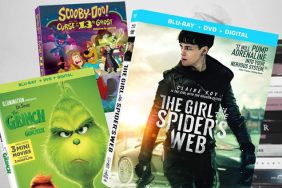Afternoon Delight is the first feature film by television writer/producer Jill Soloway, of “Six Feet Under,” “United States of Tara” and “How To Make It In America.” After it played in Sundance, we interviewed Kathryn Hahn, who stars as a mother at a crossroads in her marriage, and Juno Temple who plays a stripper she brings home to live in her family’s guest room. Now it was time to talk to writer/director Soloway.
McKenna (Temple) does introduce Rachel (Hahn) to her business of private sex work, but this is a story about Rachel resolving her feelings of stagnation, not titillating shenanigans of a housewife joining the sex trade. It is a comedy though, and a dark one as Rachel makes rape jokes. Afternoon Delight opens in theaters this weekend.
CraveOnline: Could you have done the wacky “stripper moves in with a family” Hollywood movie?
Jill Soloway: Could I have done the wacky version? I feel like it could’ve happened. The world could have let it happen because I feel like it would be very commercial. You could see this thing being a very commercial idea. I feel like I personally realized during the making of this that I am more cut out for the more human version of this story. What I have to offer as a writer/director is the stuff with the feeling in it. When we were filming and we started to do the deeper scenes, women and wine, there was real human emotion, it revealed itself to be about the human version of this story.
And also dark stuff happens. It’s not wacky shenanigans like “how will a stripper learn to do housework?”
Yeah, that’d be funny though.
Then We’re the Millers came along and did a wacky movie about a family with a stripper.
I need to see it. It is interesting that they’re coming out at the same time and that Kathryn’s in both. We’re the Millers maybe is the digestible American version of a lovable stripper, and maybe Afternoon Delight is sort of the darker side of, well, it’s really not about whether she’s a stripper or not but it’s about who these two women are in person and that in some ways they have a lot more in common as people who are missing sides of themselves.
And McKenna doesn’t have the heart of gold.
No, she’s neither. She neither has the heart of gold nor is she the villain who accidentally kills the kid when she’s driving him to a playdate, which that version also could have easily been made, the psycho drama version. Psychosexual thriller. You know what this movie is? It’s a psychosexual comedy, instead of a psychosexual thriller.
Did you ever go there?
You mean when I was writing? No, I got notes to that effect. People were like, “The husband should have sex with her. The couple should get divorced. Things should get much worse because of McKenna.” And I definitely had the thought of no, no, that’s not what this is. That is an easy train to ride, that McKenna comes in and things get really fucked up because McKenna is a negative presence. I kept switching back and forth all the way through the movie. Who’s the good person, who’s the bad person? Is it McKenna or Rachel? It keeps flipping.
And why would you assume the husband would want to sleep with someone else just because she’s there?
Well, you know, men can’t be controlled. They’re animals, that whole thing. [Laughs]
That’s the media.
Yeah, yeah, and I like that the movie challenges that as well, and were that story to happen, the message would be: and Rachel is to blame because she brought this girl home. So even if her husband did fuck the stripper, “Oh, well, Rachel had it coming to her because she brought the stripper home.” The cultural version would never even hold Jeff responsible even if he did. If we did do that, then it would all be like “look what Rachel brought upon herself.” I just kept it away.
Thank you for giving Kathryn Hahn the lead and letting her be sexy.
Oh my God, how amazing is she? She’s the best. She’s a superstar. Sometimes she would come to work and I’d be like, “[GASP] She looks like Stephanie Seymour!” When she’s really going for her most glamorous look, she’s a stunning, stunning human, beautiful, real woman. And of course she’s one of the funniest comedians ever. She reminds me of the heroines of the ‘70s, the Diane Keaton or Jill Clayburgh, these women who are great actors but you can see their face and they look real and they’re funny and they’re human and you just root for them.
Was it ever a fight for Kathryn?
Every independent film, somebody told me, as you get seven days out from when you start, this tsunami begins to happen where crew changes, people fall out. They’re like, “It’s not going to happen” because everything’s up in the air and commitments from actors shift. All I’ll say is at the very last minute, it turned out to be Kathryn. I wanted her early on and then there was all the craziness that goes with it. When you’re making an independent film it’s like this actor plus this actor equals this funding, this financing. Pull this actor out, this actor is still here but this money’s gone. It’s this frightening puzzle mosaic that is the world of independent film. The money and the attachments are all spinning together in this dryer all the way up until the minute you start shooting.
So I wanted her from the beginning, but the reality of whether or not the movie could be made with her as the lead came into question as we were getting closer. When it all turned out to work around her, there was one day I had to give a big monologue to everybody about, “I know that on paper these names don’t add up to international success, but I have to make the best movie I can. We have to bank on the movie being great to make its money, not because it has certain names, and the only way I can make the best movie I can is by having somebody who’s a great actor and truly hilarious to me in the lead, and she is both of those things.”
Was there a big money name attached who fell out?
There was the kind of “so and so’s interested, so and so’s reading it, so and so will do it but they need the offer.”
But it was that close to when you started shooting?
It was maybe six days before we started shooting.
So this is the human version of the “stripper moves in” story. Does the script also mimic how emotions actually come out? It’s not necessarily linear.
Yeah, I mean the script kind of moves in this series of spirals. I’ve been playing with this idea in my mind that the hero’s journey that we’re all taught as screenwriters may resonate more specifically for male protagonists and maybe even male viewers. Female protagonists and maybe female viewers are interested in a different structure, and this movie has that structure which is it sort of goes in a series of circles. It’s like a spiral.
So yeah, you’re constantly going, “Rachel’s bringing McKenna home because she’s mothering her, but now McKenna is mothering Rachel in the scene where she’s massaging her. Now McKenna is a bad person because we see her as a sex worker, but moments later we see her in the store as a child buying toys for the kids. Rachel is supposedly the heroine but now Rachel is actually the antagonist because she’s pushing McKenna out of the house and we’re rooting for McKenna now.”
The idea that you switch who you root for and sometimes you’re just not even sure whether or not your protagonist is behaving heroically or not, that may be a structure that feels kind of new. I think when you’re watching the movie, you do feel a little bit like you’re going in circles.
It is new. Do you think men wouldn’t respond to a messier male drama?
I don’t know. There are movies that feel this way with men in them. I really feel like WIn Win felt this way, where it’s about rescuing somebody. It’s about bringing somebody home. It’s about this kid. Win Win had a similar sort of “what am I doing?” He was kind of making really poor choices. I love how I’m quoting Win Win which nobody has seen, but that is a movie about a man, or Sideways. I think Sideways has a similar feeling where it’s like they’re on a journey, they don’t know where they’re going, they’re learning about themselves, they’re making poor choices and in the end it’s okay because life is like this. Yeah, I think there are movies about guys that work in the same way.
And you go there with rape jokes, like Kathryn joking about the African women who get raped while fetching water.
And The Accused thing.
Yes. How do you make that work because it’s a touchy subject?
In my mind, I feel like this question of whether rape jokes are funny, I like to say I’ll stop making rape jokes when men stop raping. If there were no rape, we wouldn’t need to make rape jokes but rape jokes are a way of diffusing the tension around what it feels like to be female in this world and know that rape is always out there. We’re raised with this feeling of “be careful, don’t do blah blah blah blah, you could get raped. Don’t travel on your own in Europe, you will probably get raped.”
Women make rape jokes in private and they’re a very natural part of being funny and being female. I actually feel like the question of whether or not rape jokes are funny is the same question that’s at the center of this movie. Do women have to be one thing or the other? Do you have to be a mother or a stripper? Do you have to be a sex worker or a good person? This idea that something can be painful and funny at the same time is part of the complexity of just being alive. Yeah, I’m a super duper feminist and rape isn’t funny, but neither is the Holocaust and yet The Producers was hilarious.
Fred Topel is a staff writer at CraveOnline and the man behind Shelf Space Weekly. Follow him on Twitter at @FredTopel.








